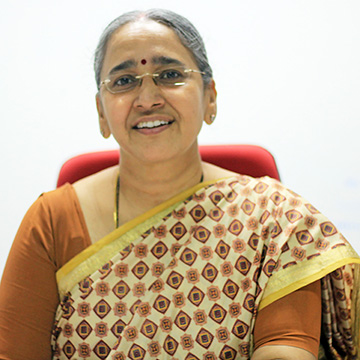
R. Vijaya
In this installment of Senior Member Insights, OPN talks with R. Vijaya—a professor of physics at the Indian Institute of Technology (IIT) in Kanpur, India, and an experimental researcher interested in all topics related to optics and photonics. Her research work spans nonlinear optics, fiber optics, photonic crystals, optical devices, miniature lasers, microstrip patch antennas and metasurfaces—all with an emphasis on applications. Vijaya has held several leadership roles at IIT Kanpur, including serving as the Head of the Centre for Lasers and Photonics from 2017 to 2018 and as the Head of the Department of Physics from 2018 to 2021.
What first interested you in pursuing science?
Growing up in a family where my father, two of my elder siblings and several extended family members were engineers meant that I heard a lot about science and technology from a young age. At school, I found science and mathematics to be exciting subjects. All my siblings were brilliant students in their school and college, which motivated me to do well.
It was the college principal (who was a physicist herself) who advised me to study physics—that was my path to science. I have now realized that I am more inclined to applied science than fundamental science, though mathematics remains an abiding interest.
What aspect of your current work do you find the most interesting or exciting?
It is difficult to choose as [in my research group] we pursue only those topics that interest and excite us, rather than what is perceived as new or topical. Unlike previous years, we are now supplementing most of our experiments with simulation, which I find exciting and a better approach.
What tips for successful networking do you have for early-career professionals?
It is beneficial to attend conferences for their entire duration, rather than to “fly in and fly out.” Attend all the sessions and interact with speakers and with others in between the sessions. This has helped me to build successful interactions over the years, and I have heard about exciting new research on unrelated topics.
What’s the best career decision you’ve ever made, and why?
If I had to choose one, I would pick my decision to work on photonic crystals when no one in India was doing any experimental work in that domain. It was very difficult to get funds initially as none of the funding agencies had heard about it, and I was asked why I chose crystal growth after training in nonlinear optics.
Today, however, there are so many groups working on this topic in India that we can conduct a conference on this subject alone. Despite the expanded interest, I think my group is pursuing problems that are very relevant in the big picture.
What skills do you think are most important for someone interested in a career like yours?
While technical skills are absolutely essential, I think it is important to have patience, perseverance and people-skills, as well as a keen eye for ethics—especially for experimentalists. Being open to course correction has also helped me over the years.
Describe a major turning point in your career. Was there a specific action/accomplishment that got you there?
The major turning point was when our group’s work got enough funding to become self-sustaining, which gave us the courage to take on more challenging problems. The reason for this turning point, I believe, was my sustained presence in all major photonics-related research events in India over the years, while also offering time and energy to the larger cause by working in national committees. The recognition my former students were receiving for their work, either through awards or career advancements, may also have helped.
What is one piece of advice that you wish you were given as a student/early in your career?
I tell this to my students frequently: Physical and mental fitness are important. No one discussed this when I was young, either in my family or in professional gatherings. I watched some of my friends get into fitness goals early in my career, but work pressure took precedence for me at that time. Today, I realize that a fully fit body and mind are essential in this career, and I wish I had realized this earlier on.
What have you learned by being a mentor to others, and what have you learned from mentors who helped shepherd your career?
As a mentor, I seek out what my mentees want to become and nudge them toward their own goals. Those who mentored me did it out of sheer selflessness; they did not do it because I followed their advice or because they saw some brilliance in me. I hope to reach that stage at some point in my career.
Outside of work, what is your favorite thing to do in your free time?
I love to read on various topics and listen to Indian classical music—two activities that have been with me since childhood. I also like to cook!
